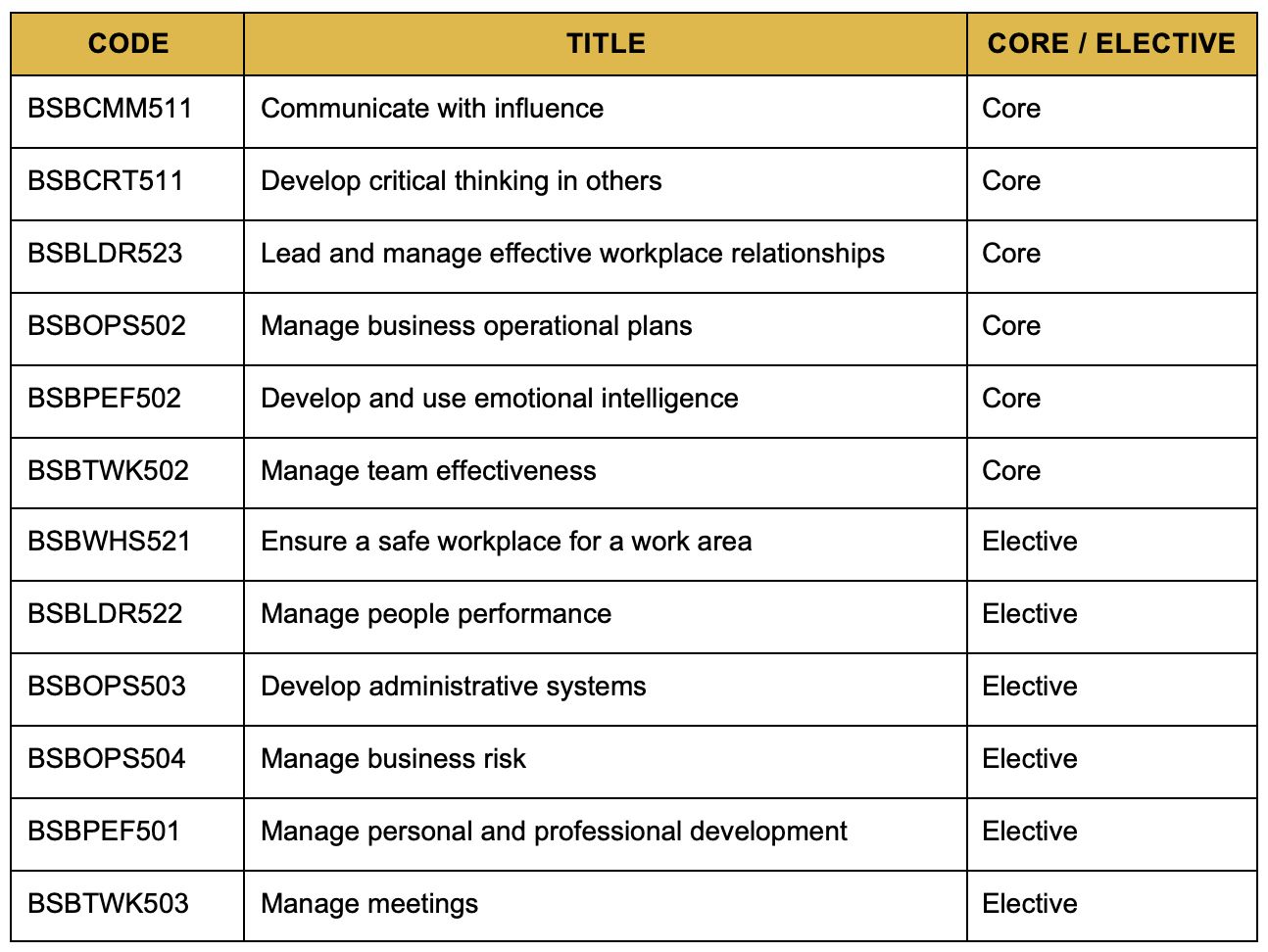
BSB50420 - Diploma of Leadership and Management
BSB50420 - Diploma of Leadership and Management

This qualification reflects the role of individuals who apply knowledge, practical skills and experience in leadership and management across a range of enterprise and industry contexts.
Individuals at this level display initiative and judgement in planning, organising, implementing, and monitoring their own workload and the workload of others. They use communication skills to support individuals and teams to meet organisational or enterprise requirements.
They may plan, design, apply and evaluate solutions to unpredictable problems, and identify, analyse, and synthesise information from a variety of sources.
No occupational licensing, certification or specific legislative requirements apply to this qualification at the time of publication.
Twelve (12) units including six (6) core units and six (6) elective units are required for the award of the BSB50420 Diploma of Leadership and Management.
The 12 units that must be completed include:
• 6 core units
• 6 elective units of which:
o 4 elective units must be selected from the elective units listed at the link below
o for the remaining 2 elective units:
up to 2 units may be selected from the elective units listed at the link below
if not listed, up to 2 units may be selected from a Certificate IV or above, from this or any other currently endorsed Training Package qualification or accredited course.
Units have been selected in accordance with the packaging rules and are relevant to the work outcome, local industry requirements and qualification level.
The latest release of the qualification and packaging rules can be found at the following link: https://training.gov.au/Training/Details/BSB50420
To be successful in Brooklyn College, international Students are mandatory to effectuate the following requirements:
- Academic Requirements
- English requirements
- GS Requirements
Academic Requirements
• Students must be at least 18 years old
• Students must have completed year 12 or equivalent
English Requirements
• Have an IELTS* score of 6.0 with no individual band scoring lowering than 5.5 (test results must be no more than 2 years old).
• English language competence can also be demonstrated through documented evidence of any of the following:
o Educated for 5 years in an English-speaking country
o Successful completion of LLN Test
GS Requirements
The genuine student requirement (GS) is an integrity measure to ensure that the Student visa Programme is used as intended and not used by international students as a way of maintaining de facto permanent residency in Australia. The GS requirement applies to all student visa applicants.
In order to be granted a student visa, applicants must satisfy the Australian Government Department of Home Affairs (DHA) that they have a genuine intention to stay in Australia temporarily, for the purpose of study.
In assessing the GS requirements, DHA will consider the requirements set out in Ministerial Direction 106. This requires DHA to be satisfied that the student visa applicant genuinely intends to stay in Australia temporarily having regard to:
The applicant’s circumstances in their home country
The applicant’s potential circumstances in Australia
Previous study in Australia
The value of the course to the applicant’s future
The applicant’s immigration history
If the applicant is a minor – the intention of a parent, legal guardian or spouse of the applicant
Any other relevant matters for more information, please visit this link: https://immi.homeaffairs.gov.au/Visa-subsite/files/direction-no-106.pdf
Target groups for the BSB50420 Diploma of Leadership and Management are international students who are:
• seeking to pursue or further a career in leadership and management
• seeking to enter a new industry sector
• seeking a pathway to higher level qualifications.
Characteristics of the target group are as follows:
Students will be from a range of countries and may be living in Australia for the first time or may have been here in the recent or more distant past.
Many will speak English as a second language, although an entry level has been set to ensure students are able to complete course work.
Students are expected to typically fall into the age range of 18 – 35 as people still establishing or changing careers.
Credit and/or RPL can be provided for those with existing skills and knowledge allowing such students to complete the course in a shorter timeframe.
It is noted that although we are required to offer RPL as per the Standards for RTOs 2015, it would not be expected that international students would pursue this pathway due to lack of relevant workplace experience and existing skills and knowledge.
This program is delivered in the classroom and self-study.
Level 6, 245 Castlereagh St, Sydney, NSW, 2000
The qualification is delivered over 52 weeks comprising of:
● 40 weeks - Classroom sessions and training support 20 hours a week.
● 12 weeks - Holiday breaks are 12 weeks.
o 40 weeks X 20 hours– Classroom training sessions (Face to Face learning) and supervised structured training support = 800 hours
● Additional hour’s contribution to studies is 400 hours
o 200 hours – Individual Learning & Reflection / Self-paced (MOODLE)
o 200 hours – Assessments/Homework - activity to complete by students
Total delivery and assessment hours therefore amount to 800 hours and the volume of learning (i.e. including unsupervised learning of homework) is 1,200 hours. A detailed breakdown of hours is provided in the Training and Assessment Schedule.
Brooklyn International College operates a system of rolling enrolments meaning that students may commence at the beginning of any unit. Students may enter the qualification after any unit, as there are no pre-requisites for any units. The Training and Assessment Schedule is shown in terms and this represents the scheduling of units on commencement. However, depending on when a student joins the course, the term number will vary.
Brooklyn International College has decided on the course duration and amount of training taking into account the AQF Volume of Learning, which is typically 1 – 2 years and 1200 – 2400 hours. It is considered that the duration and amount of training provided will allow international students the opportunity to fully absorb the required knowledge, as well as develop skills over time. This amount is not reduced to account for existing competencies, as most learners will not have any prior relevant experience. However, where learners have prior skills and knowledge they may apply for RPL or credit transfer, which will reduce the course duration if granted.
This qualification will be delivered over 52 weeks, including 40 weeks of training and assessment spread over 4 terms of 10 weeks each and 12 weeks of holidays.
Brooklyn International College has the following entry requirements: International students must: • Be at least 18 years of age and have completed Year 12 or equivalent
• Participate in a course entry interview to determine suitability for the course and student needs
• Have an IELTS* score of 6.0 (test results must be no more than 2 years old). English language competence can also be demonstrated through documented evidence of any of the following:
o Educated for 5 years in an English-speaking country; or
o Successful completion of an English Placement Test.
*Note that other English language tests such as PTE and TOEFL can be accepted. Students are required to provide their results so that it can be confirmed they are equivalent to IELTS 6.0.
Potential employment options are leadership and management roles in a range of industry areas.
Students who complete this course may wish to continue their education into the BSB60420 Advanced Diploma of Leadership and Management, a range of other Advanced Diplomas or higher education qualifications in leadership and management.
Students may apply for recognition of existing qualifications or skills, knowledge, and experience (credit transfer or recognition of prior learning). The granting of course credit may affect course fees as well as the duration of the course.
This process is outlined in Brooklyn International College’s Student Enrolment and Completion Policy and Associated Procedures and Training and Assessment Policy & Associated Procedures.

DELIVERY AND ASSESSMENT SUMMARY
The qualification is delivered over 52 weeks comprising of:
• Four (4) terms of 10 weeks each (40 weeks total)
• Holiday breaks amounting to 12 weeks (as specified in the timetable).
DELIVERY AND ASSESSMENT DETAILS
Students are required to attend 20 hours of training and assessment per week. Additional, unsupervised study is expected to be approximately 10 hours a week. The training and assessment schedule shows the weeks during which training is delivered and assessment conducted for each unit.
AMOUNT OF TRAINING AND VOLUME OF LEARNING
The total amount of training provided being structured classroom sessions is 524 hours.
Time scheduled for assessment in class is 276 hours.
Additional study which is unsupervised and may include research for assessments and general reading is expected to be on average 10 hours a week.
Total delivery and assessment hours therefore amount to 800 hours and the volume of learning (i.e., including additional, unsupervised study) is 1,200 hours.
A detailed breakdown is shown in the training and assessment schedule. Brooklyn International College has decided on the course duration and amount of training considering the AQF Volume of Learning, which is typically 1- 2 years and 1200
– 2400 hours. It is considered that the duration and amount of training provided will allow students the opportunity to fully absorb the required knowledge, as well as develop skills over time.
Where learners have prior skills and knowledge, they may apply for RPL or credit transfer, which will reduce the course duration if granted.
DELIVERY ARRANGEMENTS
A face-to-face training and assessment mode is employed for this qualification and all training will take place at Brooklyn International College’s training facilities.
Students will be provided with learning and assessment materials that they will use to develop their knowledge and understanding. All students will be provided with a range of learning support options and resources to help them achieve competency.
Students can also be supported outside of face to face through e-mail and telephone contact with their trainer. Students are provided with their trainer’s contact details at their orientation. Students are encouraged to contact their trainer at any time and trainers will liaise with students regarding their progress and provide advice as required, including any relevant course content and concepts, learning opportunities, assessment requirements, feedback on assessments and any issues the student is experiencing.
Brooklyn International College uses a range of techniques during face-to-face delivery including trainer presentations and demonstrations, individual tasks, case studies, research, role plays, practical demonstrations, and group work. The context of the simulated workplace environment will be incorporated into delivery methodologies and students will complete tasks to appropriate workplace standards.
Delivery methodologies employ terminology, equipment, resources, materials, contexts, practices, and activities associated with the workplace role.
SIMULATED TRAINING ENVIRONMENT
The simulated training environment is created as described below. In the classroom, this is achieved by using equipment, tools, technology, workplace conditions, legislation, quality standards and approaches to work that match those currently employed in industry.
Students understanding of the workplace and its requirements will be developed throughout the course.
The environment is created to suit the specific unit requirements and the trainer reinforces understanding through relating to their own experience and using learning materials. Depending on the unit content and context the classroom environment is adapted to recreate the simulated work environment.
Appropriate simulated contexts and activities are incorporated into delivery and prepare students for assessment. These align to the contexts and activities indicated in the units of competency. The simulated assessment contexts and activities also align to the requirements of each unit of competency.
During all sessions, sufficient time is allocated for students to perform the required tasks, practice their skills, and reinforce their knowledge.
FACILITIES, EQUIPMENT AND RESOURCES
The following facilities, equipment and resources will be used to deliver and assess this qualification:
• Training rooms, including desks, chairs, whiteboard, and overhead projector.
• Computers with Microsoft Office and access to the Internet.
• Learning and assessment materials as outlined in this TAS.
In addition, all students who are undertaking this qualification must have the following resources while in class.
• A laptop or computer that is installed with Microsoft Office or similar.
TRAINING
TRAINING MATERIALS
Brooklyn International College uses training and assessment resources from RTO Works, specifically their Business Works range, and has a complete set of training materials which includes the following:
• User Guide: This provides important information relating to the delivery of quality training and assessment.
• Trainer Guide: The Trainer Guide provides the trainer with training content, activities, delivery resources, and links to videos, further reading and additional material to help guide delivery. The Trainer Guide is in the ‘Training’ folder for each unit.
• Student Guide: The Student Guide provides students with learning content, activities and links to videos, further reading and additional material to help develop knowledge and skills.
• PowerPoint presentation: Each Trainer and Student Guide are supported by a PowerPoint presentation. The slides highlight key learning points.
• Trainer Guide Mapping: A Trainer Guide Mapping is included with each unit of competency. It shows how the content of each Guide aligns to the unit of competency.
A Trainer Guide Mapping is found in the ‘Training’ folder for each unit.